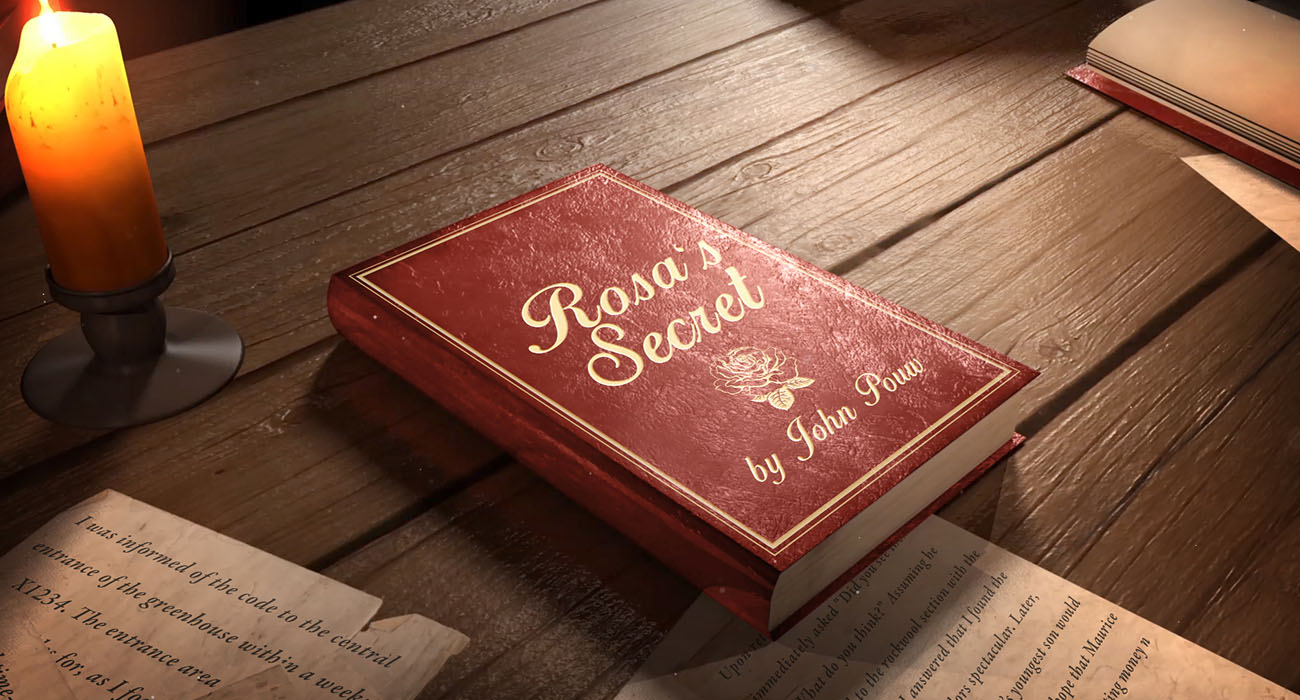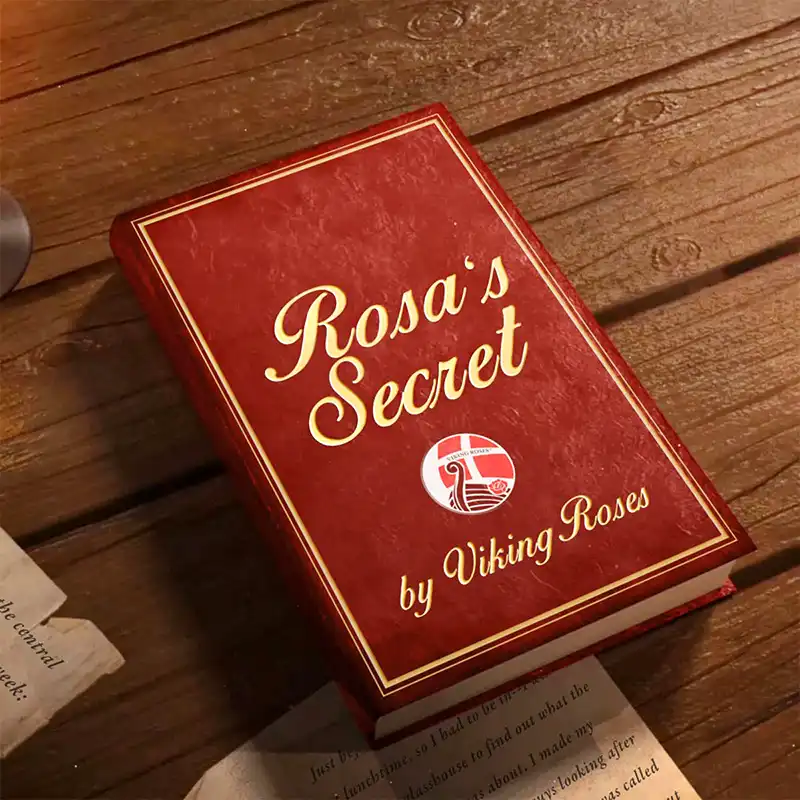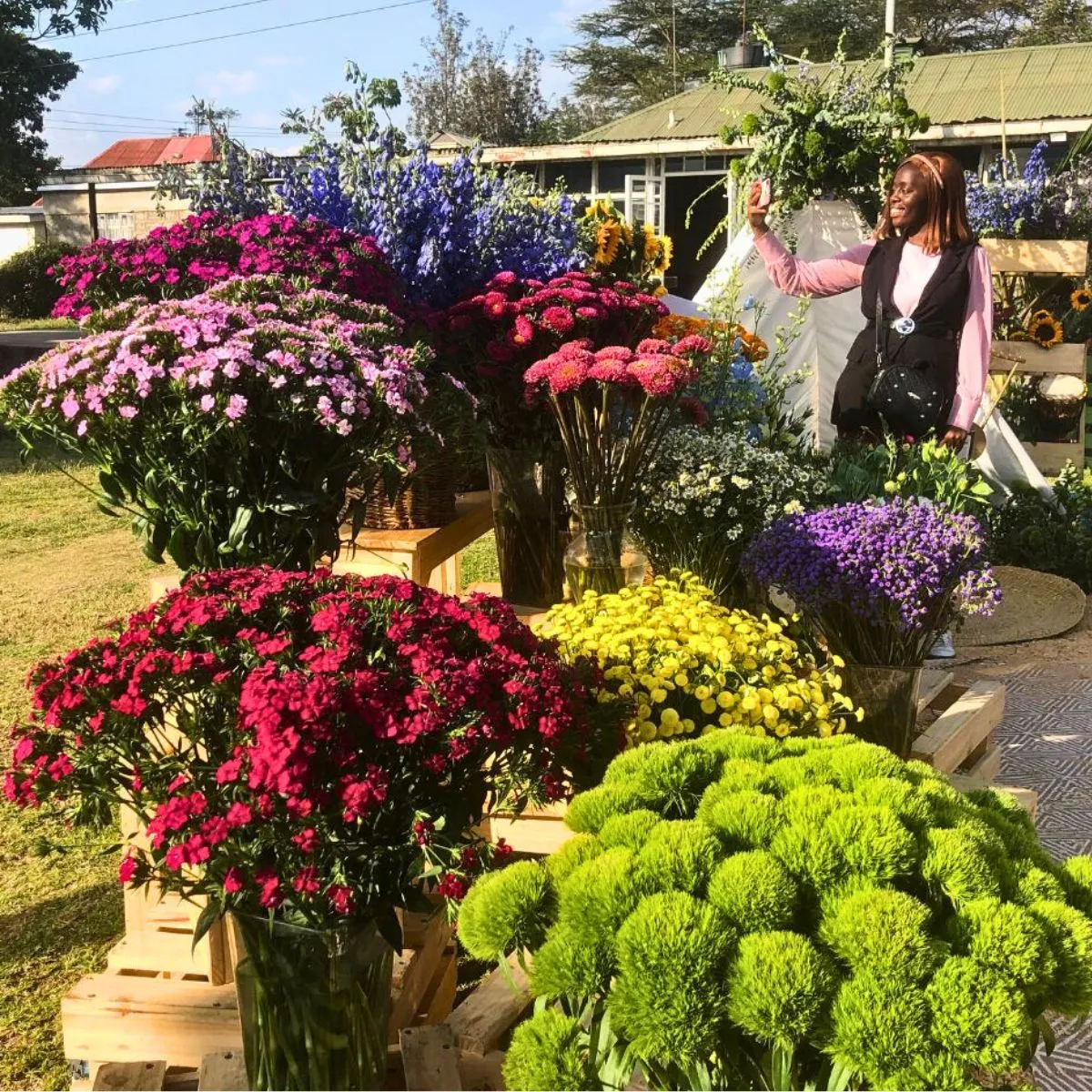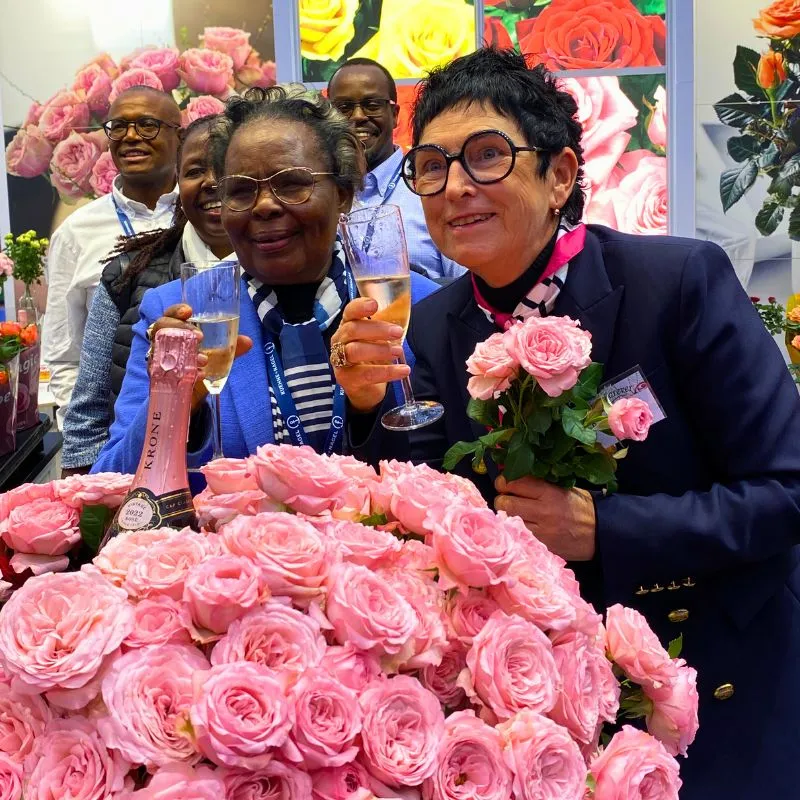HHP seemed to be discovering the flower world, like I was. I was a participant at Dick Turf’s first show in the Oro Verde Hotel in Quito and now the Sheraton in Harare. The rose caravan would set up quarters wherever Dick went. After the first show the full name ‘Holland Horticulture Promotion’ was crossed out to favor the abbreviation HHP.
Snuf had collected the best flowers of the Witte de Wit varieties, including Premier Rouge®, for which LAVAL had given permission, and HHP had organized collective shipment, including PR materials: new posters and folders. The old windmill-with-blond-girl background had been replaced by ‘the magical flair of Witte de Wit’ with the blue background and silhouette of a girl with the spotlight on a pink rose. We had taken the idea from a perfume ad with the aim to no longer promote individual varieties, but a company brand. It was premiered in the “Vakblad voor de Bloemisterij’, with many positive reactions.
My room was on the fourth floor, with the exhibition on the second. The flowers had arrived and the hyper-active HHP arrangers were setting up the booths in high spirits and loud music. There was no time to visit many farms. All management would come to the show anyway, so I could speak to them there. I had found out, that many of the owners were regular farmers that had added a few hectares of flower production for export reasons, read ‘hard currency’. Viaflor collected, packed and exported from their place at the airport. So, in fact, the Zimbabwe flower industry was wholesale controlled.
Rosie’s ex-son-in-law Doug, a former boxer who divorced her daughter, but continued to be employed as her manager, picked me up the next day to visit a few farms. The show would start the following day.
Doug took me to Viaflor, with the Dutch manager Arjen van den Burg, and a farm in the Trelawney area and then we met Rosie for a luxurious outdoor lunch. The afternoon was reserved for a trip to Victoria Falls and a boat ride on the Zambezi River. I found the falls far more impressive and unspoiled than the Niagara Falls that I had visited a few times in Canada. Doug had made special arrangements for the boat ride. It felt odd to be spotting crocodiles while drinking cold white wine. In the evening Doug, Rosie and I had an extensive dinner in an exclusive restaurant. Over lunch we had discussed my impression of the South African market, Kenya, and changes at Witte de Wit. Over dinner Rosie, Doug merely listened, told about their plans for the Witte de Wit varieties: besides the trials in Zambia, which we unfortunately couldn’t visit this time, they were going to set up a showcase in Zimbabwe and some beds in South Africa. They were also getting organized in Kenya and proposed to include the Witte de Wit assortment there as well. Rosie must have been aware of the purpose of my visit and realized she had been underperforming for us. We would meet again in the morning for the opening of the ‘International Floriculture Exhibition and Conference’.
The show was to be opened by the Chairman of ZimTrade and the Dutch Ambassador. I also had two roles in the subsequent seminars, one as a speaker on ‘Technical Aspects of Flower Marketing’ and the other in a panel debate on ‘Marketing Strategies: Cut Flowers’. Interestingly, the starting seminar was on ‘Auctioning in Holland’ and I had noticed that one of the stands in the show was of ‘Bloemenveiling Holland’ (Westland flower auction). Would this mean a change in policy with respect to flower imports?
Back in the hotel, outside on the balcony with the entrance road fully lit and packed with cars, I was annoyed with the royal treatment that I had been given by Rosie. Then I noticed a big black Mercedes trying to overtake on the pavement but getting stuck. In the back I recognized President Mugabe, gesturing. That morning, Doug had given me an overview of the political situation in Zimbabwe. After becoming independent from the United Kingdom in 1980, changing the name from Rhodesia into Zimbabwe a few years later, Robert Mugabe had become President, turning from a popular socialist freedom fighter into a paranoid dictator, at night closing off the part of Harare with his palace, so that all traffic needed an extra hour to go round. The economy continued to be run by the white minority, despite many mainly British immigrants having moved to South Africa.
The Deputy Minister of Industry and Commerce, Mr. Moyo, had shown up for the symbolic opening of the Fair, with the seminar as a kick-off. The addresses of the representatives of the two major Dutch auctions and Mr. Doesbrug, chairman of the auctions’ association, were looked forward to, but turned out boring summaries of facts and no standpoints on imports.
In my speech, ‘The Beauty of Breeding and the “Pain” of Paying Royalty’, I attempted to explain that royalties are no taxes, but a necessity to move the industry forward.
“Then, why do breeders breed? You should see breeders as fundamentalists, fanatics who constantly challenge nature and at the first flowering of the new seedlings are like nervous fathers walking up and down the corridor, waiting for the birth of their child. This is the beauty of breeding. The newborn child in our case are the seedlings, the new generation of varieties of which normally 99.9 per cent are thrown away and if after 5 to 10 years of testing one variety of commercial interest is left of this generation, you are lucky.”
The panel discussion was about the future of spray roses, with Wilhelm Von Bismarck, Arent Ruighaver, David Keary of Zimcor and I. Superplant were specializing in spray roses, Von Bismarck and Witte de Wit didn’t see this product are part of their core business and Keary complained that existing spray varieties damaged in transport and were the first flower to be taken out of a bouquet. Ruighaver defended with the prospect of his next generation of sprays, which was far superior and was very surprised and happy with my remark, that I foresaw a great future for the spray rose, similar to the spray carnation, but then disappointed when I added that it would however take some 10-15 more years. The fair was opened, and the regular cut rose breeders were all there again: Von Dismarck and Rosen Vorbeck from Germany; Groupe Ferry and Lebrun from France; Superplant, Terra Blanca and Witte de Wit from Holland. There were propagators from Holland, Eric Coen and Bontekoe, and Israel, Goliath Nurseries, Beny Hazan Nurseries, Dgani Nurseries and Giv’at Mahore. Speelman was not active in Africa. Rosie Rhodes had a big stand with mainly Superplant varieties (no Witte de Wit’s). Then, there were stands with all other flower lines, transport, packaging, cooling specialists, flower preservatives, MPS (a Dutch association trying to set environmental standards in flower and plant production), etc.
Understandably, LAVAL was missing, with (potential) owners and (previous) owner caught up in all sorts of legal battles. Premier Rouge® was in the stands of Witte de Wit and the Israeli propagator Giv’at Mahore. Omer Jefferson Jr. was there as CIOPORA board member, the Americans having no booths.
The BVH (Westland flower auction) was closed with red-white ribbon earlier in the day.
At the show I met David and Kathy Sole, who had no idea Rosie Rhodes represented standard roses, let alone Witte de Wit’s, because they only saw spray roses. They were very sympathetic tobacco farmers and had just installed a 2-hectare rose greenhouse. The flower business was new to them and they for sure liked the Witte de Wit’s varieties in the stand, especially Total Success®. Zimcor had advised them to speak to me. Since the show finished on Friday and I was flying on Sunday, we agreed a visit on Saturday. They were not too far from Harare.
The next morning, the elevators in the hotel were not working. Luckily, I was on the 4th floor, so I took the stairs. I had learned that the Sheraton was the central place for all kinds of events and even the government had its meetings here, as the American security of the hotel allowed them to work safely. Hence, I wasn’t surprised to run into various military on the stairs. When I entered the lobby, however, the place was packed with security of all kinds: hotel staff, military. Having done my compulsory army service, I was aware of the high ranks of the soldiers there. It was hectic, noisy, until life seemed to stop, nobody talked, nobody moved, except for this head with grey curls above all the others, entering the lobby and people stepping aside, dead quiet. Witnessing, I had the same surreal feeling that I had had on my first day in Africa, in the crater with the floating giraffes. Here was another one, larger than life, reducing the magical, wonderful world of roses to a petty activity. Nelson Mandela.
Later, I found out that seven African presidents had come together for a meeting that day and that they had also toured the show, in our absence. I had watched Nelson Mandela’s release from prison, his walk to freedom, live on TV and now my all-time hero and saint had actually watched our flowers. The mythical world of roses.
After this, Friday’s closing reception, offered by ZimTrade, was an anti-climax. Many of the participants had already checked out in the morning and were on their way home. The KLM flight was on Sunday, so for the sake of something better, the Dutch and Germans and some French were present. I shared a table with Wilhelm, Bernd and Omer, always looking sharp and a statesman and as such re-baptised by his German-dominated group as ‘Kaiser Omer’. Rosie, Doug, Arent Ruighaver and some followers were at the adjacent table. Drinks and music until a huge, drunk threatening man came in, waving his huge hands, making his way to Rosie’s table, about to start a fistfight with Ruighaver. Bernd jumped to his feet, interfered and Omer rescued Ruighaver by maneuvering him to the other side of our table. Hotel staff guided the angry giant out. WTF was that all about?
Omer apparently knew and Bernd whispered: “That was Arthur, Rosie’s husband. He’s a South-African farmer. I guess he has found out about the affair of Arent and his wife.” Never a boring day in the roses.
The next morning David Sole picked me up. He was aware of the African summit in the Sheraton the previous day. It had been in the paper that morning. David only saw the headlines. It took us just under an hour to arrive at his farm, Solaflor. The Soles had invested in a very professional set-up. An Israeli consultant had been hired to train the Soles and their staff. “Surprisingly, growing roses is very similar to growing tobacco,” David remarked. At some point he walked into an isle in the Bentley® roses—he only grew Von Bismarck varieties. He wanted to see one of his workers at the end. “How was the visit to the hospital yesterday, Charles? Did your mum get some results?” Next week. David cared for his workers and his plants. We met with Kathy for lunch in their house to discuss the world of roses outside Zimbabwe. The Soles were eager learners and would love to come over to Holland for the next November show.
I explained Witte de Wit’s change in policy for the big rose production countries and the malfunctioning of the Rosie Rhodes’ agency. “Of course this is confidential, but I trust you to such an extent that I want you to think about the possibility to set something up together.” The Soles were perplexed and after some time Kathy reacted: “But you are internationally established, have been in this business for ages and we are just getting started.” “That’s right, but like you, we’re also learning every day. You have the attitude and green fingers that we need. We’re hiring a rose specialist who will visit on a regular basis, and we’ll help you out wherever we can. Just think about it. No hurry.”
Terminating the agreement with Rosie had no big consequences, as it was stipulated that, in case of termination, the agent would keep the right to market the varieties introduced in the agent’s territory and the right to introduce varieties that were still on trial. For lack of any royalty income from Zimbabwe and with a view of a possible change of agency, Witte de Wit had not sent any new codes in the last year. Big Anton had not been fully supportive. He had generously driven Rosie to her hotel after the centennial party at Jacobzoon’s and felt that it was not good for our reputation to terminate all kinds of long-standing agreements. Sjef’s “but Anton, we don’t say goodbye on a personal level. Of course, we will continue to see Rosie at all kinds of rose gatherings,” had settled the issue.







